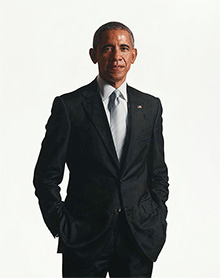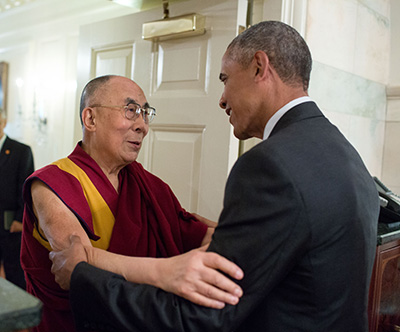Barack Hussein Obama II is the forty-fourth President of the United States 2009-2017. He is the first African-American to have served as president.

Barack Obama was born on August 4, 1961, in Honolulu,
Hawaii. This makes him the first president to be born outside the contiguous United States. He grew up mostly in Hawaii, but also spent one childhood year in Washington State and four years in Indonesia. His father was from Kenya and his mother from Kansas. He was also raised with help from his granparents.
Obama studied and graduated from Columbia University in 1983. After graduating he worked in Chicago as a community organizer, helping to rebuild communities suffering from steel plants shutting down. In 1988 he started Harvard Law School where he was the first African-American president of the Harvard Law Review. After graduation he became a civil rights attorney and professor at the University of Chicago Law School (1992 - 1994), teaching constitutional law. In 1989 he met Michelle Robinson - they were engaged in 1991 and married October 3, 1992. She would later become the first African American First Lady, known for her commitment to American citizens - , becoming a role model for women and an advocate for poverty, awareness, nutrition, physical activity and healthy eating. She is also became a fashion icon and one of the most popular first ladies in US history.

In 1995 Obama publishes his autobiography "Dreams from my Father".
From 1997 to 2004, Obama began a career in public service, and represented the 13th District for three terms in the Illinois Senate. In this position he earned bipartisan support for legislation that reformed ethics and health care laws, as well as sponsoring a law to increase tax credits for low-income workers. He also negotiated welfare reform, and promoted increase subsidies for childcare. In 2001 he was co-chairman of the bipartisan Joint Committee on Administrative Rules, and supported regulations by Republican Governor Ryan to prevent home foreclosures.
In 2003, Obama became chairman of the Illisnois Senate's Health and Human Services Committee, where he lead a unanimous, bipartisan process of legislation to monitor racial profiling. A year later, police representatives credited Obama for his active participation with police organizations in death penalty reforms. He was a part of other legislation such as "Secure America and Orderly Immigration Act".
From 1994 to 2002, Obama served on the boards of directors of the Woods Fund of Chicago—which in 1985 had been the first foundation to fund the Developing Communities Project—and of the Joyce Foundation. He served on the board of directors of the Chicago Annenberg Challenge from 1995 to 2002, as founding president and chairman of the board of directors from 1995 to 1999.
Obama was elected to the Illinois Senate in 1996, succeeding Democratic State Senator Alice Palmer from Illinois's 13th District, which, at that time, spanned Chicago South Side neighborhoods from Hyde Park–Kenwood south to South Shore and west to Chicago Lawn. Once elected, Obama gained bipartisan support for legislation that reformed ethics and health care laws. He sponsored a law that increased tax credits for low-income workers, negotiated welfare reform, and promoted increased subsidies for childcare.] In 2001, as co-chairman of the bipartisan Joint Committee on Administrative Rules, Obama supported Republican Governor George Ryan's payday loan regulations and predatory mortgage lending regulations aimed at averting home foreclosures.
In 2004 he started serving in the U.S. Senate after a landslide election. By 2008 he was nominated for president after a close primary campaign against Hillary Clinton. He was then elected as our 44th President of the United States - winning more votes than any candidate in history.


Obama was inaugurated on January 20, 2009. In 9 months he was named the 2009 Nobel Peace Prize laureate for “his extraordinary efforts to strengthen international diplomacy and cooperation between peoples.”
Some of the first bills signed into laws by Obama were: the Lilly Ledbetter Fair Pay Act, and the reauthorization of the State Children's Health Insurance Program (SCHIP) which covered 4 million addition uninsured children.
He put a cap on top executive pay to companies receiving bailout money from the federal government. He hosted the very first online discussion at the White House, answering questions asked by people through the website.
He signed a number of landmark bills during his first two years in office. 3 big reforms were: the Patient Protection and Affordable Care Act , the Dodd–Frank Wall Street Reform and Consumer Protection Act, and the Don't Ask, Don't Tell Repeal Act (2010).
 During the first 2 years he also appointed two women to serve on the Supreme Court: Sonia Sotomayor and Elena Kagan - bringing the number of women on the Supreme Court at one time to three justices for the first time in US history. During the first 2 years he also appointed two women to serve on the Supreme Court: Sonia Sotomayor and Elena Kagan - bringing the number of women on the Supreme Court at one time to three justices for the first time in US history.
Within his first 100 days as the 44th President, Obama worked toward withdrawing trops from Iraq. He eventually ended military involvement in the Iraq War.
Other events during this term:
- Created the White House Council on Women and Girls, to advise him on issues of welfare of women and girls.
- Pledged 100 million dollars to assist Haiti after a terrible earthquake.
- Announced 900 million in grants for under-performing schools if they accept new reforms.
- Signed the Strategic Arms Reduction Treaty (START) with President Medvedev of Russia to reduce the stockpile or nuclear weapons by the US and Russia.
- Signed the Dodd-Frank Wall Street Reform and Consumer Protection Act.
- Put in practice a bill that assisted a cheaper or free college tuition for those who have served in the US military.
- Signed Rosa's Law, to change the words used in federal statutes - from "mental retardation" to "intellectual disability".
- Signed the "Healthy, Hungre-gree Kids Act of 2010, that funded nutrition and free lunch programs and new standards for the schools.
He also expanded laws to protect the LGBT community - for instance the Matthew Shepard and James Byrd Jr. Hate Crimes Prevention Act, so hate crimes included ones motivated by a victim's actual or perceived gender, sexual orientation, gender identity or disability.
In 2011, the focus of Present Obama's State of the Union address was on education and innovation, and making the US more competitve globally. He spoke of eliminating tax breaks for oil companies, a 5 year freeze in domestic spending, reversing tax cuts for the wealthiest, banning congressional earmarks, a reduction of healthcare costs and a push for more electric vehicles and an increase in "clean" electricity reliance. oil companies, a 5 year freeze in domestic spending, reversing tax cuts for the wealthiest, banning congressional earmarks, a reduction of healthcare costs and a push for more electric vehicles and an increase in "clean" electricity reliance.
In July 2013, Obama expressed reservations and said he "would reject the Keystone XL pipeline if it increased carbon pollution [or] greenhouse emissions. On February 24, 2015, Obama vetoed a bill that would have authorized the pipeline. It was the third veto of Obama's presidency and his first major veto.
In December 2016, Obama permanently banned new offshore oil and gas drilling in most United States-owned waters in the Atlantic and Arctic Oceans using the 1953 Outer Continental Shelf Act.
Obama emphasized the conservation of federal lands during his term in office. He used his  power under the Antiquities Act to create 25 new national monuments during his presidency and expand four others, protecting a total of 553,000,000 acres (224,000,000 ha) of federal lands and waters, more than any other U.S. president. power under the Antiquities Act to create 25 new national monuments during his presidency and expand four others, protecting a total of 553,000,000 acres (224,000,000 ha) of federal lands and waters, more than any other U.S. president.
Obama ran for a second term and defeated Republican opponent Mitt Romney, swearing in for a second term in 2013. During this term he promoted more inclusiveness for the LGBT community, pressing the Supreme Court to strike down same-sex marriage bans as unconstitutional. He advocated for gun control after the Sandy Hook Elementary School shooting. He issues wide ranging executive actions on climate change and immigration.
In his second inaugural address, he asked for full equality for gay Americans - being the first President to do so, in addition to the first time a president even mentioned gay rights in such an address.
President Obama left office in January 2017 with a 60% approval rating.

|

